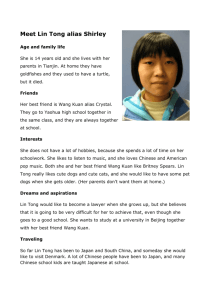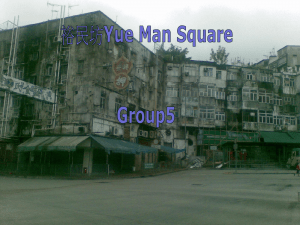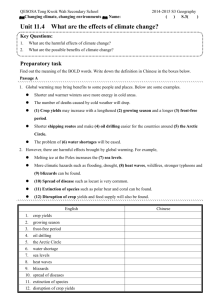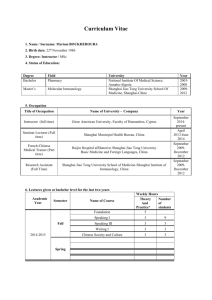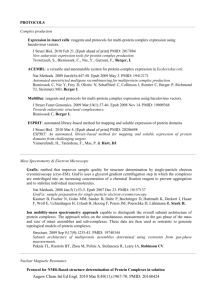姓 名
advertisement
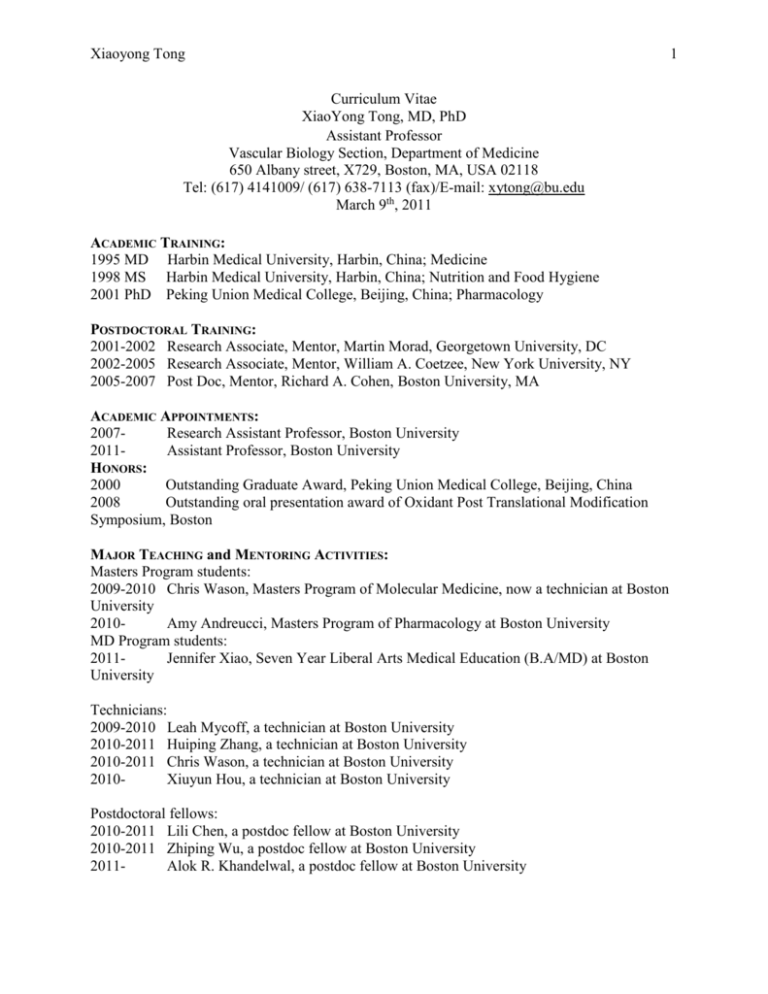
Xiaoyong Tong Curriculum Vitae XiaoYong Tong, MD, PhD Assistant Professor Vascular Biology Section, Department of Medicine 650 Albany street, X729, Boston, MA, USA 02118 Tel: (617) 4141009/ (617) 638-7113 (fax)/E-mail: xytong@bu.edu March 9th, 2011 ACADEMIC TRAINING: 1995 MD Harbin Medical University, Harbin, China; Medicine 1998 MS- Harbin Medical University, Harbin, China; Nutrition and Food Hygiene 2001 PhD Peking Union Medical College, Beijing, China; Pharmacology POSTDOCTORAL TRAINING: 2001-2002 Research Associate, Mentor, Martin Morad, Georgetown University, DC 2002-2005 Research Associate, Mentor, William A. Coetzee, New York University, NY 2005-2007 Post Doc, Mentor, Richard A. Cohen, Boston University, MA ACADEMIC APPOINTMENTS: 2007Research Assistant Professor, Boston University 2011Assistant Professor, Boston University HONORS: 2000 Outstanding Graduate Award, Peking Union Medical College, Beijing, China 2008 Outstanding oral presentation award of Oxidant Post Translational Modification Symposium, Boston MAJOR TEACHING and MENTORING ACTIVITIES: Masters Program students: 2009-2010 Chris Wason, Masters Program of Molecular Medicine, now a technician at Boston University 2010Amy Andreucci, Masters Program of Pharmacology at Boston University MD Program students: 2011Jennifer Xiao, Seven Year Liberal Arts Medical Education (B.A/MD) at Boston University Technicians: 2009-2010 Leah Mycoff, a technician at Boston University 2010-2011 Huiping Zhang, a technician at Boston University 2010-2011 Chris Wason, a technician at Boston University 2010Xiuyun Hou, a technician at Boston University Postdoctoral fellows: 2010-2011 Lili Chen, a postdoc fellow at Boston University 2010-2011 Zhiping Wu, a postdoc fellow at Boston University 2011Alok R. Khandelwal, a postdoc fellow at Boston University 1 Xiaoyong Tong 2 OTHER PROFESSIONAL ACTIVITIES: PROFESSIONAL SOCIETIES: 2004Member of the New York Academy of Sciences 2004Member of the American Heart Association/American Stroke Association 2006Member of American Physiological Society 2006Member of the Society for Free Radical Biology and Medicine (SFRBM) 2007Member of American Diabetes Association REVIEWER OF PROFESSIONAL JOURNALS: American Journal of Physiology, British Journal of Pharmacology, Cell and Tissue Research, Acta Diabetologica, Medical Science Monitor, Journal of Clinical and Experimental Pharmacology and Physiology, Journal of Physiology and Biochemistry, Journal of Vascular Research, consulting editor of Journal of Leukocyte Biology STUDY SECTION: 2011Ad hoc reviewer of American Heart Association Vascular Wall Biology Basic Science study section (Vas Wall Bio AAGI BSc3) ATTENDED INTERNATIONAL MEETINGS: 2003 Biophysical Society Annual Meeting, San Antonio 2003 American Heart Association Scientific Sessions, Orlando 2006 Oxidant Post Translational Modification Symposium, Boston 2006 Society for Free Radical Biology and Medicine (SFRBM) annual meeting, Denver 2007 American Diabetes Association Scientific Sessions, Chicago 2007 SFRBM annual meeting, Washington D.C. 2008 Oxidant Post Translational Modification Symposium, Boston 2008 SFRBM annual meeting, Indianapolis 2009 10th MOVD (Mechanisms of Vasodilatation), Mastsushima, Japan 2009 American Diabetes Association Scientific Sessions, New Orleans 2010 American Diabetes Association Scientific Sessions, Orlando 2010 American Heart Association Scientific Sessions, Chicago 2011 American Diabetes Association Scientific Sessions, San Diego Current Support 2010-2012 American Diabetes Association Junior Faculty Award 7-09-JF-69 PI: XY Tong, Title: Upregulation of Nox4 by TGF beta causes vascular dysfunction in obese Zucker rat. $120,000 per year 2010-2014 R01 NIH HL31607-26A1 PI: RA Cohen, Co-I: XY Tong, Title: Redox regulation of SERCA by Nitric Oxide. $250,000 per year 2009-2011 R21DK084390 PI: RA Cohen, Co-I: XY Tong, Title: Nitric Oxide in Hemodialysis AV Fistula Maturation. $125,000 per year 2009-2011 Servier Alliance Fund. $150,000 per year Xiaoyong Tong 3 Past Support: 2005-2010 R01 NIH HL31607 25 PI: RA Cohen, Co-I: XY Tong, Title: NO, SERCA and Oxidative Stress in Atherosclerosis. $237,045 per year 2001-2005 R01 HL64838-01 PI: WA Coetzee, Title: Role of Kir6.1 subunits of potassium channels in heart. $250,000 per year Original, PEER REVIEWED ACTICLES: 1. Li R, Tong XY, Pan HZ, Zhang SM, He W. (2000) The effect of dietary nucleic acid on immune function in mice at different ages. Acta Nutrimenta Sinica, 22(1): 36-39. 2. Xuan GD, Tong XY, Zhao X. (2000) The improved extraction methods of dietary nucleic acid. Chinese Journal of Health Laboratory Technology 10(3): 337-338. 3. Ren Y, Tong XY, Wang XL. (2000) Expression of ATP-sensitive potassium channel subunits in rat tissues. Chinese Pharmacological Bulletin 16(2): 148-150. 4. Tong XY, Wang XL. (2001) The GIRK1 and IRK1 expression levels in memory deficit rats. Yao Xue Xue Bao. 36(7):485-8. PMID: 12585076 5. Lu J, Tong XY, Wang XL. (2002) Altered gene expression of Na+/Ca2+ exchanger isoforms NCX1, NCX2 and NCX3 in chronic ischemic rat brain. Neurosci Lett. 332 (1): 21-4. PMID: 12377375 6. Tong XY, Cleeman L, Morad M. (2003) Partial sequencing of the cardiac Na+-Ca2+ exchanger of the spiny dogfish (squalus acanthias). Bulletin of the Mount Disert Island Biological Laboratory. Vol 43, p133-134. 7. Pan Y, Xu X, Tong XY, Wang X. (2004) Messenger RNA and protein expression analysis of voltage-gated potassium channels in the brain of Abeta(25-35)-treated rats. J Neurosci Res. 77(1):94-9. PMID: 15197742 8. Zhong C, Pan Y, Tong XY, Xu X, Wang X. Delayed rectifier potassium currents andKv2.1 mRNA increase in hippocampal neurons of scopolamine-induced memory deficient rats (2005). Neurosci 373(2):99-104. PMID: 15567561 9. Morrissey A, Rosner E, Lanning J, Parachuru L, Dhar Chowdhury P, Han S, Lopez G, Tong XY, Yoshida H, Nakamura TY, Artman M, Giblin JP, Tinker A, Coetzee WA (2005). Immunolocalization of KATP channel subunits in mouse and rat cardiac myocytes and the coronary vasculature. J Cardiovasc Pharmacol. 45 (2): 165-74. PMID: 15647111 10. Morrissey A, Parachuru L, Leung M, Lopez G, Nakamura TY, Tong XY, Yoshida H, Srivastiva S, Chowdhury PD, Artman M, Coetzee WA (2005). Expression of ATP-sensitive K+ channel subunits during perinatal maturation in the mouse heart. Pediatric Research 58: 185-192. PMID: 16085792 11. Tong XY, Porter LM, Liu G, Dhar-Chowdhury P, Srivastava S, Pountnery DJ, Yoshida H, Artman M, Fishman GI, Yu C, Iyer R, Morley GE, Gustein DE, Coetzee WA (2006). Consequences of cardiac myocyte-specific ablation of KATP channels in transgenic mice expressing dominant negative Kir6 subunits. Am J Physiol Heart Circ Physiol. 291 (2): H543-51. PMID: 16501027 12. Ying J, Tong XY, Pimental D, Weisbrod R, Trucillo MP, Adachi T, Cohen R (2007). Cysteine-674 of the sarco/endoplasmic reticulum calcium ATPase is required for the inhibition Xiaoyong Tong 4 of cell migration by nitric oxide. Arterioscler Thromb Vasc Biol. 27(4):783-90. PMID: 17234728 13. Malester B*, Tong XY*, Ghui I, Xu J, Hendricks-Munoz KD and Coetzee WA (2007) Transgenic disruption of endothelial KATP channels in the mouse: effects on coronary flow mediated by altered endothelin-1 release. FASEB J. 21(9):2162-72. (Co-first author) PMID: 17341678 14. Tong XY*, Ying J, Pimentel DR, Trucillo M, Adachi T, Cohen RA (2008). High glucose oxidizes SERCA cysteine-674 and prevents inhibition by nitric oxide of smooth muscle cell migration. J Mol Cell Cardiol. 44: 361-369. (corresponding author) PMID: 18164028 15. Lancel S, Zhang J, Evangelista A, Trucillo M, Tong XY, Siwik D, Cohen RA and Colucci WS (2009). Nitroxyl anion activates SERCA in cardiac myocytes via glutathiolation of cysteine 674. Cir Res. 104(6):720-3. PMID: 19265039 16. Tong XY* and Schröder K (2009). NADPH oxidases are responsible for the failure of nitric oxide to inhibit migration of smooth muscle cells exposed to high glucose. Free Radical Bio Med. 47(11):1578-83. (corresponding author) PMID: 19733235 17. Tang W, Kravtsov G, Sauert M, Tong XY, Hou X, Wong T, Sookja C, Chung S (2010). Polyol pathway contributes to impairment of SERCA and RyR in ischemic-reperfused rat hearts. J Mol Cell Cardiol. 49(1):58-69. PMID: 20025885 18. Tong XY*, Hou X, Jourd’heuil D, Weisbrod RM, Pimentel DR, Cohen RA (2010). Upregulation of Nox4 by TGF beta1 oxidizes SERCA and inhibits NO in arterial smooth muscle of the prediabetic Zucker rat. Cir Res.107 (8):975-83. (corresponding author) PMID: 20724704 19. Lancel S, Qin FZ, Lennon SL, Zhang J, Tong X, Kang J, Dorn G, Siwik D, Cohen RA and Colucci WS (2010). Oxidative post-translational modifications mediate decreased SERCA activity and myocyte dysfunction in Gαq-overexpressing mice. Cir Res. 107(2):228-32. PMID: 20508180 20. Tang W, Cheng W, Kravtsov K, Tong XY, Hou X, Chung SK and Chung S (2010). Cardiac contractile dysfunction during acute hyperglycemia due to impairment of SERCA by polyol pathway mediated oxidative stress. Am J Physiol -Cell Physiology. 299(3):C643-53. PMID: 20573996 REVIEWS 1. Tong XY, Zhao X, Li R. (1999) Nucleic acid nutrition and its effect on immunity. Chinese Journal of Preventive Medicine. 33(3):180-182. PMID: 15446301 2. Zhao X, Tong XY, Li R. (2000) The effect of nucleic acid on aging. Chinese Journal of Geriatrics 19: 72-74. 3. Tong XY, Wang XL. (2001) The effects of presenilin and beta-amyloid on potassium channels. Chinese Pharmacological Bulletin 17(2):132-5. 4. Tong XY*, Evangelista A, Cohen RA (2010). Targeting the redox regulation of SERCA in vascular physiology and disease. Curr Opin Pharmacol. 10(2):133-8. (Invited review, corresponding author) PMID: 20045379 5. Cohen RA and Tong XY*. (2010). Vascular oxidative stress: the common link in hypertensive and diabetic vascular disease. J Cardiovascu Pharmacol. 55(4):308-16. (Invited review, corresponding author) PMID: 20422735
